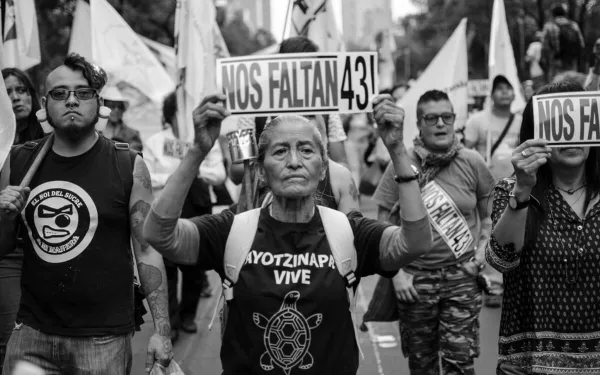Corruption has existed in Mexico from the early decades of state building. Since then, it has evolved into a virus-like phenomenon that has invaded every area of the country. Serving as a cornerstone of Mexican politics, it has forced citizens to survive in an atmosphere where the only option is to be the player or the played. From people offering bribes to ministers accused of plagiarism, corruptive conduct plagues people, politicians, and companies alike – some out of ego, others out of need.
What’s worse, the security forces entrusted with protecting the state have deteriorated into a corrupted organism themselves. Mexico’s police forces, like most institutions in the nation, are known to tolerate corruption in order to run sustainably.
Many have blamed the culture of dishonesty in the Mexican force on the absurd wages allocated to police officers.To give you an idea, the average annual wage of a cop is 152,000 Mexican pesos, which is around 7,400 euros. Meanwhile, the cost of living in the country for a single person is more than 13,500 euros, which is almost twice the amount supplied by the average salary. As a result, many police officers, like countless others afflicted by Mexico’s massive wage gap, resort to bribes and other illegal transactions in order to receive better pay.
However, this is not a one-sided behavior. After all, in order to accept a bribe, one must first offer one. According to recent studies, 6 out of 10 Mexicans admit to having paid a bribe, which is 50% more than the OECD average. Further statistics have found that at least 13 bribes are paid throughout the country per minute. Citizens are not only accustomed to a system that would withdraw punishment for the correct price, but they are also afraid of putting their lives in peril by refusing to hand money to officials when requested. Numbers like these show how most Mexicans have become both victims and perpetrators of the country’s corruption.
Police in Mexico are also known to conspire with criminal groups in exchange for greater compensation, participating in violence in the process and instilling further distrust in the institution. Only nine years ago, they were implicated in one of the most notorious state-sponsored criminal cases in contemporary Mexican history. Police units, in collaboration with criminal groups, the executive administration, and the military, abducted and killed 43 students, sparking one of the country’s largest social protests in the last decade under the motto “Nos faltan 43.”

Likewise, they have assisted the government to commit state crimes. Six years prior, municipal police were the primary culprits of the Atenco protests, in which two teenagers were killed, 300 people were unlawfully arrested and over 40 women were sexually tortured. What unites these two criminal cases, and every other in Mexican history, is that neither was ever resolved, and no single high-ranking authority was ever held accountable.
A lack of adequate training in Mexican police units has exacerbated the issue, resulting in the growth of a corruptive culture within the institution and a plethora of unsolved crimes. According to a 2019 poll by Causa en Común, 19% of police in the country had not received instruction on arrest and use of force and 29% had missed out on gender awareness training. Moreover, only select personnel have access to target practice and suitable equipment; many have to buy their own work tools and uniforms. As a result, many times the police force’s lack of suitable work equipment as well as a real grasp of the law leads to erroneous arrest processes and little to no useful evidence.
In a similar manner, improper recruiting practices continue to foster impunity in the country by hindering the establishment of a sustainable, prepared, and competent police force. Today, 75% of Mexico’s active municipal and federal police officers are uncertified, and 50% of them have work-related injuries or health issues that render them unfit for duty.
All of these circumstances have contributed to high rates of criminal impunity, which explains why only 5.2% of crimes in the country are solved. Police officers have been unable to fulfill their jobs in an ethical and effective manner, whether owing to a lack of resources, knowledge, or morale. With minimal education and training, most police personnel are vulnerable to being influenced by criminal organizations, misjudging a situation in times of stress, or engaging in corruptive behavior. It is because of this that Mexico ranks second to last in Latin America in public view of police honesty.
So, what can we do? Some have proposed that body cameras should be implemented on a nationwide scale to improve accountability. Those opposed have swiftly pointed out the high expenses, privacy concerns, and impossibility of such an initiative to effectively solve the police institution’s core faults. Others have asked for improved screening methods in the employment of police personnel and improving employee benefits, beginning with the ability to unionize. However, unions in Mexico have been responsible for the formation of hierarchies in which individuals at the top have been able to transfer money and other resources into their wallets.
Unfortunately, police forces in Mexico are under the jurisdiction of local governments ‘that are underfunded due to widespread tax evasion’. Thus, to reform the institution one would have to rebuild the system itself — the country would have to redefine transparency and accountability at every level of government.
Having said that, there are other civilian-focused initiatives that may influence police reform and better governance in the institution. For instance, the government can sponsor state-wide campaigns educating people about their rights and basic legislation to keep in mind when interacting with police officers. Or simplify and advertise easy-to-use and efficient platforms where civilians can anonymously denounce microaggressions and extortion at a local level. Yes, the root issues of corruption are too deep to simply rip out, but there is a thing or two that as Mexicans we can do to stimulate positive change in our country’s institutions.
Featured image: Unsplash





